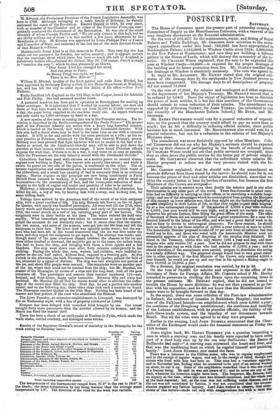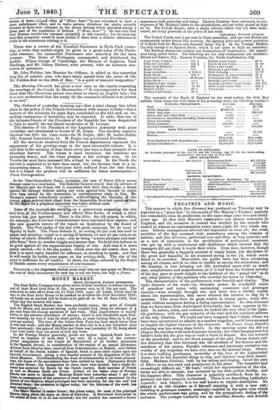POSTSCRIPT.
SATURDAY.
The House of Commons spent the greater part of yesterday evening in Committee of Supply on the Miscellaneous Estimates, with a renewal of the very desultory discussions on the financial administration.
On the vote of 103,4671. for the maintenance, repair, and fitting of Royal Palaces and Public Buildings, Mr. OSBORNE drew attention to the extra. vagant expenditure under this head: 763,2961. has been appropriated to Buckingham Palace; 1,516,000/ to Windsor Castle since 1824; 2,000,000/ to the New Palace at Westminster; and now they are building a hideous gallery in the House of Lords, which will destroy the symmetry of the in- terior. Sir CHARLES WOOD explained, that the sum to be expended this year at Windsor Castle-16,6001.—is required for the proper drainage of the building and its better protection from fire. Mr. SLANEY testified that the drainage at Windsor is absolutely necessary. The vote was agreed to. In reply to Mr. AGLIONBY, Mr. HAWES stated that the original esti- mates of the damage done by the earthquake in New Zealand proves to have been exaggerated. The damage done to all descriptions of property did not exceed 15,000/ On the vote of 57,2001., for salaries and contingent and other expense?, in the department of her Majesty's Treasury, Mr. HENLEY moved that it be reduced by 5,040/. Since the object of legislation has been to diminish the prices of most articles, it is but fair that members of the Government should submit to some reduction of their salaries. The amendment was supported by Alderman SIDNEY, Sir Jonas TYRELL, (as calculated to test the sincerity of the Manchester Reform School,) Mr. BUCE, and Mr.
SPOONER.
Mr. HENRY DRUMMOND would vote for a general reduction of expendi- ture, on the ground that the country could afford to pay no more than so much; but he felt a difficulty in reducing official salaries, since public business has so much increased. Mr. BROTHERTON also would vote for a general reduction, but not for a reduction in the salaries of her Majesty's Ministers alone.
The amendment was more decisively opposed by other Members. Colo- nel TnomPsors did not see why her Majesty's servants should be expected to give up their chance of participating in the benefit of reduced prices.
Sir CHARLES Wool) could not see that public servants are overpaid, since they so often leave the public service for the better pay of private employ- ment. Mr. Gm-summit observed, that the individuals whose salaries Mr. Henley proposed to reduce are the very persons visited with the In- come-tax.
Mr. COBDEN explained, that he should vote for the amendment on grounds different from those stated by the mover: be should vote for it, not because the prices of food and other articles are diminished, since that en- ables the country better to bear its burden of taxation, but because the first Ministers of the Crown are overpaid—
Their salaries are in amount more than double the salaries paid to any other functionaries in my other part of the world. Those functionaries in ether coun- tries had no difficulty in carrying on their offices, or in exercising a suitable hospi-
tality; and one of the advantages which be contemplated from putting the Ministers of this country on lower salaries was, that they might set the fashion of adopting a
grease SiMpliciti in their habits of life, so that they might impart their hospital- ity at a less extravagant expense. If the salaries of 5,0001 a year were reduced to 4,0001., that sum would still be very high; and it would not exclude any man,
whatever his private fortune, from filling the great offices of the state. The office
of Secretary of State did not necessarily entail a great expenditure; for a man who devoted himself to the labour of his office, and who had a great deal of work to do, had no time to devote to extravagant pleasures. For these reasons, he should
have no objection to see these salaries of 5,0001. a year reduced at once to 4,0001. The honourable Member proposed to take off 10 per cent from all salaries: but that would not be fair, and those who voted with the honourable Member need not
necessarily approve of his plan of disposing of the surplus thus obtained. He found in the Treasury, clerks who only receive 1501. a year and less, and mes- sengers who only receive 701. a year. Now he did not propose to deal with these men in the same way as with those who had salaries of 5,0001. a year ; and he should therefore, if the amendment were carried, propose to distribute the saving in a totally different way. The proposed change would lead to very great reduc- tion in other quarters: if the first Minister of the Crown only received 4,0001. a year himself, he would not get up and say that in his opinion a Bishop ought to have 10,0001. or 15,0001. a year.
On a division, the original resolution was carried, by 84 to 33. On the vote of 76,0001. for salaries and expenses in the office of the Secretary of State for Foreign Affairs, Mr. COBDEN asked if Mr. Henley
intended to persevere in dividing the House upon the remaining items in the present estimate. Mr. HENLEY replied, that he did not intend to. trouble the House by more divisions: he was not then prepared to go fur- ther with his opposition; and he did not know that the Misoellaneous Esti- mates were to be brought forward on that day. In the sequel, there was some criticism of the Poor-law administration in Ireland; the costliness of lunatics in Bethlehem Hospital; the useless-
ness of the Falkland Islands—an establishment which costs 6,0001. a year; the costliness of the Hongkong establishment; the costliness and inutility of the Labuan establishment, with its pluralist officials; the futility of the Anti-Slave-trade system, and the impolicy of our demeanour towards Brazil. But all the votes were agreed to as they were proposed.
Earlier in the evening, Lord JOHN RUSSELL announced that the Chan- cellor of the Exchequer would make the financial statement on Friday the 15th instant.
Some nights back, Mr. HENRY HERBERT' put a question 'respecting a case in which a starving man and his family were reported to have eaten part of a dead body cast up by the sea near Ballinrobe: the Rector of Ballinrobe had said—" A starving man extracted the heart and liver, and that was the maddening feast on which he regaled himself and perishing family." Lord Joins Roseau. now stated the facts. There was a labourer in the Clifden union, who was in regular employment and in the receipt of regular wages, and not in the receipt of relief, though two sisters who lived with him had been so. This man had a voracious appetite; and in November last, finding what he conceived to be pert of an animal washed on shore, he cut it up. Some of the neighbours remarked that it was the trunk of a human being. He said he was not aware of it; and he never ate any of the flesh, whatever his intention might have been. The Inspector, Mr. Briscoe, held an inquiry at the time, when this man was himself examined, and the whole was at the time reported; but, as the man was not suffering under distress, and as the act was not occasioned by famine, it was not considered that the circum- stances required any further inquiry. Lord John wished to observe, that state- ments of this nature—made not only with exaggerations but with a total die- tortion of facts—(Lott Ole* of "Hear, hear)")—are calculated to have a most unfortunate effect, and to make persons disbelieve the stories actually founded on facts with reference to the severe distress which prevailed among a great part of the population of Ireland. ("Hear, hear! ") He was sure that that distress excited the warmest sympathy in this country ; but he must say s.hat that sympathy would be more certain if there were a stricter adherence to truth in the statements relating to it.



























 Previous page
Previous page